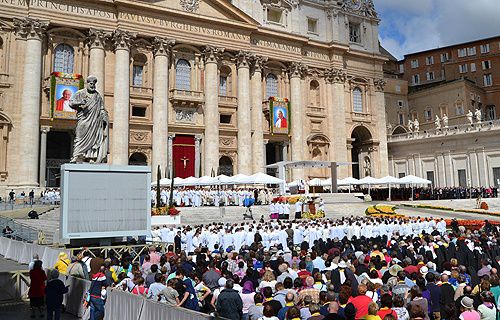Following the canonization of Popes John Paul II and John XIII, Church officials presided over two Masses of Thanksgiving, drawing attention to the saints’ enormous contributions to the Church and to society. Taking place April 28 at 10 a.m. in St. Peter’s Square, where the day before huge numbers of pilgrims crowded for the canonization of the ecclesial giants, Cardinal Angelo Comastri led the congregation in giving thanks for the 27-year pontificate of John Paul II. In his homily, Cardinal Comastri — who is Archpriest of St. Peter’s Basilica and Vicar General for the Vatican City State — emphasized the courage John Paul II had in proclaiming the Gospel, especially during a time when the world pretended as if God no longer existed. Observing how the pontiff’s witness became stronger, even as his body became weaker, the cardinal reflected that his faith was “authentic and free from fear or compromise.” He then highlighted the saint’s untiring defense of the family and the dignity of human life, also drawing attention to his firm opposition to the Gulf Wars and his efforts in establishing peace among peoples and nations. Cardinal Comastri concluded his reflections by emphasizing the special attention the pontiff gave for the youth, as well as his devotion to Mary, into whose hands he had entrusted himself and his whole life. Present for the April 27 canonization of the Polish saint was a young man named Nicholas and his father, who recounted to CNA an encounter they had with the pontiff in Rome when Nicholas was just a toddler. Explaining how they had come for the beatification of three nuns, Nicholas’ father recalled that “We didn’t have tickets” for the Mass, but were still able to get in. “Some nuns that were there from Brazil asked us to get on the end of the bench,” he continued, adding that the nuns told him “that John Paul II was going to stop and that he was going to touch” his son’s head. “And that’s what happened. Nicolas really stopped the Pope who touched his little head and he was one-and-a-half years old.” Reflecting on what it meant for him to be in the square again for the canonization of the pontiff who had stopped to bless him, Nicholas said that “being here today is very special because all of that.” “I think it marked my life a lot. And I think he has helped me in all the moments of my life,” the youth noted, emphasizing that he has “never” lost his faith because “he has always been up there. So today it’s going to be interesting.” At the same time as pilgrims were giving thanks in St. Peter’s Square, others expressed gratitude for the life and witness of Saint John XXIII, gathering at the Church of San Carlo al Corso, which is the same church where the pontiff had received his episcopal ordination. Bishop Francesco Beschi, who currently oversees the pontiff’s former diocese of Bergamo, presided over the ceremony, during which he responded to Pope Francis’ April 24 letter thanking the diocese for the gift of John XXIII to the Church. In his letter, Pope Francis referred to the diocese of Bergamo, Italy as “a land of profound faith lived in daily life, of poor families but united in love of the Lord, of a community capable of sharing in simplicity.” He affirmed to the people there his certainty that “civil society will always be able to find inspiration in the life of the Pope of Bergamo and of the atmosphere he generated, seeking new ways and adapting to the times in order to build a life based on the perennial values of fraternity and solidarity.” Referring to the Pope’s statements, Bishop Beschi expressed that such encouragement would help all in the Church there to guard the values of generosity, simplicity, and solidarity which characterized so much of the young Angelo Roncalli, as well as his later pontificate. The letter also assists Bergamo to respond to the current challenges and signs of the times with the same spirit of obedience espoused by “Good Pope John,” the bishop went on to say. Concluding, he affirmed that Pope Francis’ words to them will help the diocese to faithfully adhere to the path set by the Second Vatican Council, which was opened by John XXIII in 1962, and during which he called for a renewal in the life of the Church, which would revitalize the faith of all Christians.
Mauricio Artieda contributed to this article.

